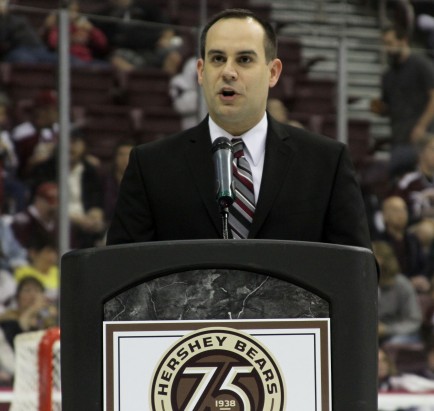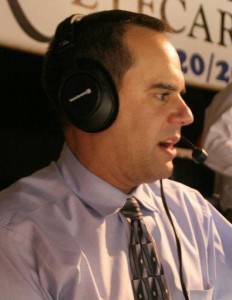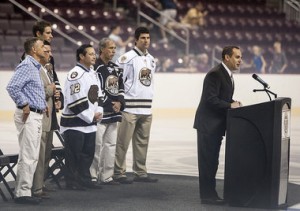

(Editor’s note: This piece on Hershey Bear play-by-play announcer Scott Stuccio first appeared on Lebanon Sports Buzz in December of 2011. It was reprinted with permission.)
BY JEFF FALK
Scott Stuccio is paid to talk publicly to an audience about his employer.
Does that affect what comes out of his mouth? You bet it does.
In these days of political correctness and an overly sensitive public, Stuccio is merely a product of a culture. Stuccio is a sports broadcaster.
 More specifically, Stuccio is a play-by-play announcer and color analyst for radio and television broadcasts of American Hockey League games played by the Hershey Bears’ franchise. He is employed by the Bears and the second part of his title reads ‘and Media Relations Manager.’
More specifically, Stuccio is a play-by-play announcer and color analyst for radio and television broadcasts of American Hockey League games played by the Hershey Bears’ franchise. He is employed by the Bears and the second part of his title reads ‘and Media Relations Manager.’
“You’ve got to be very, very positive,” said Stuccio. “As much as you can. It’s a tough position to be in. You’re almost lying when you sugar-coat it.
“It’s very difficult to separate myself from that position,” Stuccio continued. “There is a sense of public relations to it. You have to be truthful, but do it respectfully.”
A native of Wilkes-Barre, Stuccio, 39, held a similar brodcaster/media relations position with the Wilkes-Barre/Scranton Penguins for the past three seasons. While there, he was also employed by the franchise.
Stuccio is currently in his second year of calling Bears’ games, after John Walton, who was promoted to the Bears’ parent club, Washington, in August of 2011.
“Sometimes it’s very hard to hide your feelings,” said Stuccio. “I’ve had to say, ‘This team isn’t playing well. Something has to be done.’ Or ‘This guy isn’t playing well.’ I’m not going to say the team stinks or I’m not going to say a player stinks.
“But stats don’t lie,” Stuccio added. “That’s the best way to do it. Read the stats. ‘Tonight, this guy was minus-three.’ But you’ve got to point out things when they aren’t going well.”
 There was a time not that long ago when broadcasters were journalists and worked independently of the franchises they were covering, usually for a local radio or television station. They were paid – and taught – to ‘report’ the action without bias.
There was a time not that long ago when broadcasters were journalists and worked independently of the franchises they were covering, usually for a local radio or television station. They were paid – and taught – to ‘report’ the action without bias.
In the American Hockey League, it seems that a majority of broadcasters are employed by the franchise for which they ‘cover’. But that current trend transcends minor league hockey and spills over into the NHL, Major League baseball and the NBA.
“There are a lot of people who do the dual roles,” said Stuccio. “I’d say it’s a good three-quarters of the league. I really don’t know about other sports. I would imagine Comcast employs broadcasters like Chris Wheeler. I really didn’t follow the broadcasting of sports before I got into it. All I know is that it’s not an easy position to be in.
“I have respect for the players,” added Stuccio. “I travel with them and I’m with them 95 percent of the time. I believe in doing it respectfully.”
But do the fans of teams know employs their broadcasters? And if they do, do they care?
“Oh sure, most fans know where broadcasters come from and who they work for,” said Stuccio. “Here, most especially. It drives die-hard fans nuts. They don’t like to hear everything positive. They want their broadcasters to be critical. So yeah, it does matter to the fans.”
